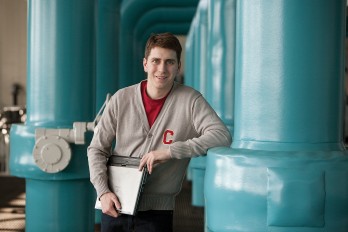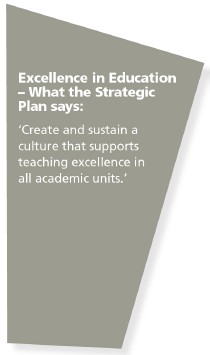COVER STORY SIDEBAR


Graduate student Mike Walsh. See larger image
The key to using technology to enhance the educational and student experience is online collaborative software, says Mike Walsh. Not only does working on class projects online foster engagement and collaboration among students, whose classroom may be only virtual, but the resulting extensive documentation of the process ensures that a project lives on for future students.
Walsh, 27, is a Ph.D. candidate in the Department of Biological and Environmental Engineering and the student-elected representative to the Cornell Board of Trustees. He is also the teaching assistant for Sustainable Development, a Web-based course that was one of the first exclusively online classes offered for Cornell undergraduates when it was created a decade ago by Norm Scott, now a professor emeritus of biological and environmental engineering.
"This is a new way we're going to have to reach students," Walsh says. "This is not your private way of thinking; this is now the new, transformed information exchange."
However, he points out, a professor's support and collaboration is crucial to making the online components of even traditional classes successful, and in some cases there is a generation gap. In many instances, professors have been won over to using online technology when they have "sat in" on chat rooms and read students' discussion threads. Then they see the forms the conversations take and get a real sense of how the students are learning and what they are experiencing, and they can tweak the course based on this nearly live feedback.
Today, Scott's visionary course is getting new content because of the rapidly changing world of sustainability. Walsh also is working on integrating new technologies like Facebook, Twitter and texting to reach students on platforms they are constantly tuned in to.
During the past decade, the course grew to 415 students from 15 before it was purposely trimmed to 200 for this academic year as Scott retired and Professor Mike Walter took over, with Walsh as teaching assistant.
The course was started "with the idea that technology and the Web were going to be a content-delivery mechanism in the future for education," Walsh says. The course has not yet used what many people think of when they imagine online classes -- there are no video-streamed lectures or specific virtual classroom time. It's all about content delivery and student engagement, from reams of online documentation (peer-reviewed journals, nongovernmental organizations' sustainability reports) to chat rooms, discussion boards and quizzes administered through course management software.
And the projects created by the students are built, commented upon, revised and ultimately shared completely online. "The syllabus has to be dynamic because the information is changing so fast, as well as the technology," Walsh says.
Walsh also helped turn the Sustainable Development final exam into an online, collaborative project.
For the class midterm and final, students collaborated in small groups and in two phases to develop their own sustainability action plan, analyzing their apartments or fraternity houses, for example, and creating sustainability assessments and recommended actions by looking at likely environmental, social and economic impacts.
The plans were then turned into websites where the entire process, supporting documentation and plans were posted.
"We want them to create a public website, a dynamic action plan," Walsh says. "One that they might have created, but somebody beyond them can take ownership of. We definitely want some of the students next year to take that plan and all the connections that were made, and keep going with it."
